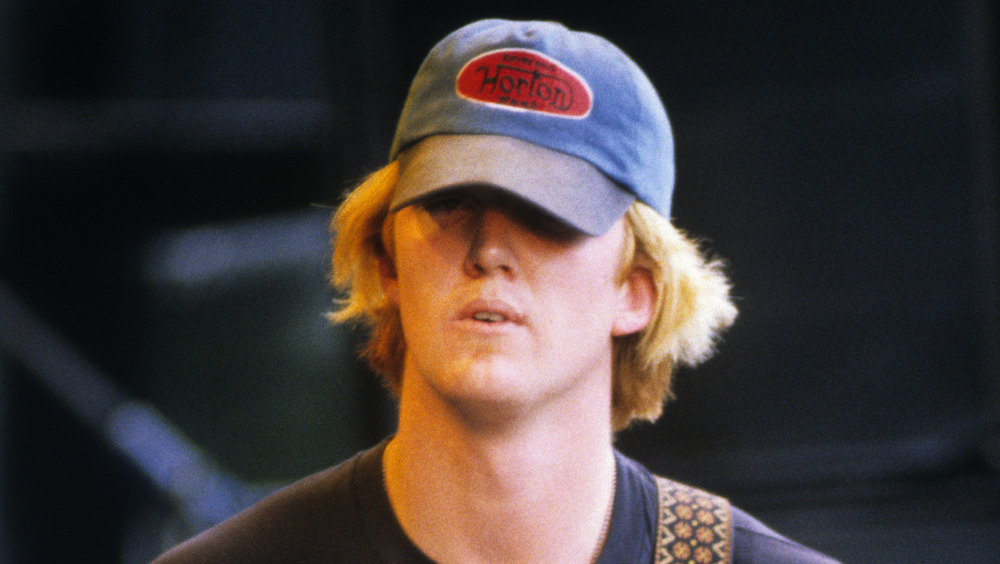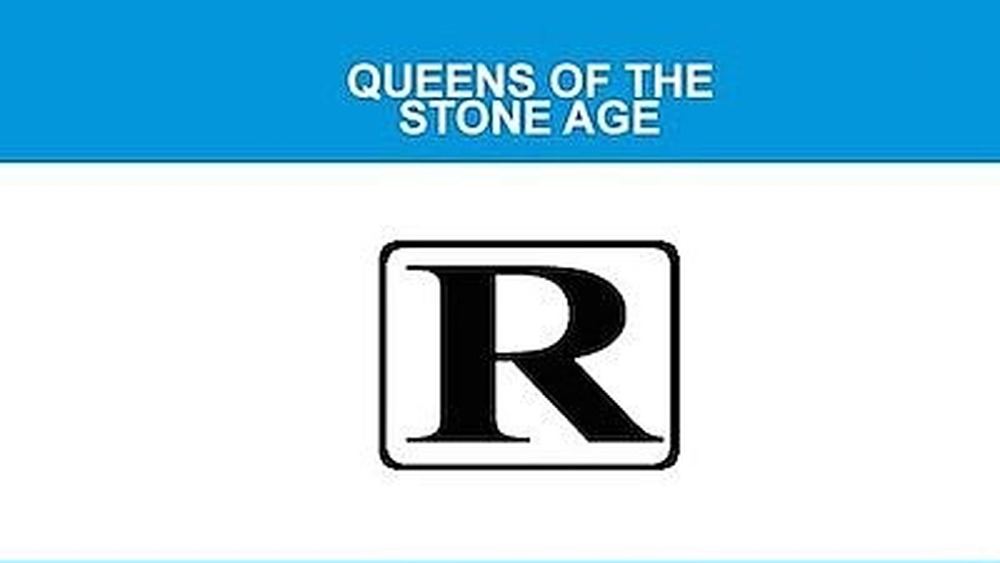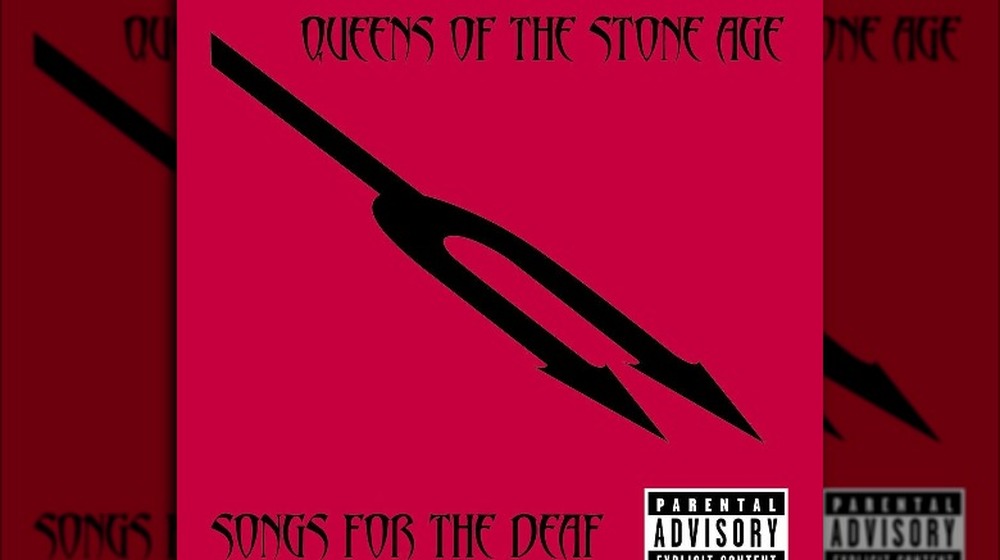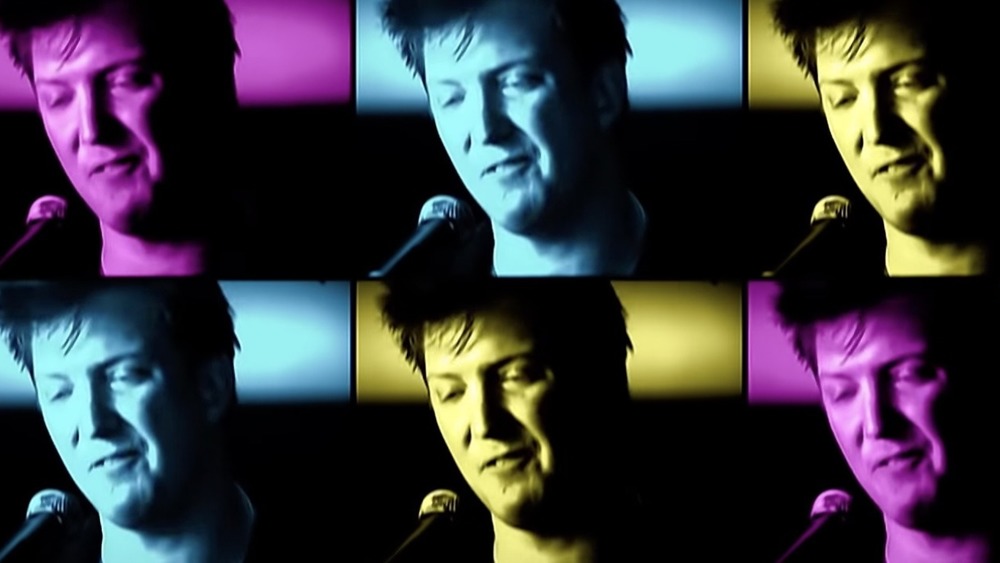The Untold Truth Of Queens Of The Stone Age
Queens of the Stone Age made themselves one of the most exciting and successful rock bands of the 21st century with a unique brand of hard rock. It's dark, aloof, and melodic enough to get the band airplay on alternative rock radio stations, but it's also full of heavy classic rock signifiers — like loud, crunchy guitars, thunderous drums, and totally wailing guitar solos. At any rate, Queens of the Stone Age emerged out of the American southwest with a determination to bring back simple (but loaded) rock n' roll. Led by virtuoso guitarist and hauntingly voiced singer Josh Homme, his modern metal warriors have churned out numerous cool, catchy songs that get fans totally pumped up, like "Feel Good Hit of the Summer," "The Lost Art of Keeping a Secret," and "Little Sister."
Here then are some facts about the band that almost no one knows, so go with the flow and read on for some sick, sick, sick stories about Queens of the Stone Age.
Queens of the Stone Age was a supergroup
Before the members of the Queens of the Stone Age took their throne amongst modern rock royalty, there was Kyuss. Named for a character in the Dungeons and Dragons role-playing game, the group came together in 1990 under the direction of singer John Garcia. It rose to the top of the early 90s fuzzy, metal-and-punk-influenced "stoner rock" or "desert rock" scene, playing parties and other small gigs in the small and often remote towns that dot the desert areas of Southern California. The band built up a small but loyal following and released four albums by 1995, including two with major label Elektra.
At that point, Kyuss dissolved, owing to increasing creative tensions between Garcia and the band's guitarist, Josh Homme. After the split, according to AllMusic, Homme toured with Seattle grunge band Screaming Trees then aimed to put together a loose collective of musicians, an all-star group of 90s rock heavyweights. Recruiting Matt Cameron of Soundgarden, Mike Johnson of Dinosaur Jr., Van Conner of the Screaming Trees — and eventually, Kyuss guitarist Nick Oliveri — the first iteration of Queens of the Stone Age was born.
Queens of the Stone Age was not the band's first name
Queens of the Stone Age is objectively a terrific band name — it connotes grandeur and the ability to epically rock but also contains a little bit of humor and mystery. Fans almost missed out on the name and all of its glory, because the group was originally named something else. When Josh Homme put the project together in the 1990s, he came up with the name Gamma Ray. However, according to blog.jr, a German metal band also called Gamma Ray got wind of this upstarted American music collective and threatened to sue, forcing Homme to pick something else.
Early collaborator and producer Chris Goss devised the phrase "Queens of the Stone Age" and christened the band with it. It's a name that attempts to describe the band's powerful but nuanced and unifying sound. "Rock should be heavy enough for the boys and sweet enough for the girls. That way everyone's happy and it's more of a party," Homme told Complex. "Kings would be too macho. The Kings of the Stone Age wear armor and have axes and wrestle. The Queens of the Stone Age hang out with the Kings of the Stone Age's girlfriends when they wrestle."
A big fan joined the band
Queens of the Stone Age was never set-up like a traditional rock band, and dozens of musicians have come in and out of the group, including Elton John, Trent Reznor, and Foo Fighters founder Dave Grohl. Prior to becoming a lead singer and guitarist, Grohl was famously the drummer in Nirvana, and it's in that capacity that he's played on multiple Queens of the Stone Age releases, including the band's seminal 2002 album Songs for the Deaf. The opportunity came along at the perfect time for Grohl, who at the time was mired in tough and contentious recording sessions for the Foo Fighters' fourth album, One by One, and needed a respite. "It was one of those things where everybody knew there was something wrong and everybody was frustrated but we weren't talking about it," Foo Fighters guitarist Chris Shiflett told Louder, regarding Grohl's temporary departure.
Grohl liked singer Josh Homme's prior band Kyuss, and Queens even more, so much that he asked the group to be the Foo Fighters' opening act on its 2000 tour. When Songs for the Deaf sessions began, Homme had heard that the Foo Fighters had taken a hiatus, and he called up Grohl because its usual drummer, Gene Trautmann, left the group. "I called Dave and said, 'Can you come right now?'" Homme told MTV News. "It was noon, and he said, 'I'll be there at 6:30,' and by 8 p.m. we had tracked a few songs."
Queens of the Stone Age got kicked out of rehab
According to NME, in November 2007, Queens of the Stone were invited to perform a small, intimate, and very exclusive show — the group accepted the chance to play for the residents of a drug rehabilitation facility in California. All those people seeking sobriety filed into an area for the special treat of a concert by one of the decade's biggest bands, and Josh Homme and company opened their show with the rousing song that opens its 2000 album, Rated R – "Feel Good Hit of the Summer."
The song isn't really about songs or summertime, however. The title is wryly humorous, as the lyrics consist entirely of a repeated list of the names of drugs, stimulants, and intoxicating substances — "Nicotine, valium, vicodin, marijuana, ecstasy and alcohol / c-c-c-c-c-cocaine!" Yep, Queens of the Stone Age played to an audience of recovering addicts and started with arguably the most simplistically drug-centered song in rock history. Staff at the rehab center was so appalled that the band hadn't even finished playing "Feel Good Hit of the Summer" before they'd unplugged their equipment and directed security guards to forcibly remove Queens of the Stone Age from the building.
Queens of the Stone Age talked its way out of getting banned from Walmart
Queens of the Stone Age's 2000 song, "Feel Good Hit of the Summer," doesn't technically implore the listener to try any of the many drugs its lyrics mention over and over, but just stating their names does constitute some blunt drug references. That all made for a dicey situation when Queens of the Stone Age planned to release "Feel Good Hit of the Summer" as a single from the album Rated R. "We're getting this feedback that lots of people won't even play it," band leader Josh Homme told Rolling Stone of the song's radio viability at the time. "They don't look at it in a very positive light."
It wasn't just radio stations that were hesitant. Walmart, a major retailer of compact discs at the time, told Queens of the Stone Age that they wouldn't put Rated R in its thousands of stores, unless they took off "Feel Good Hit of the Summer." After some negotiations, the chain agreed to stock Rated R, albeit with a warning label alerting customers to the naughty language therein. Amusingly, Homme attested to Walmart that it didn't need to bother with the warning — by virtue of it being titled Rated R, it already warned minors to stay away. "After that, they agreed to carry it," he said.
Queens of the Stone Age once conducted two tours at the same time
A concert tour is a large undertaking. A band has to haul its equipment to a distant arena, set up for enormous shows, play a great show to the delight of an audience that paid good money for the privilege, then pack it all up, get into cars, trucks, and vans, and do the whole thing in another town the next day — and all for months on end.
It's a grind, and yet in 2005, Queens of the Stone Age took on double duty, hitting the road for a large-scale arena tour while also hitting smaller clubs along the way. According to Billboard, Queens of the Stone Age served as the opening act on Nine Inch Nails' 2005 Live With Teeth Tour, playing large and venerable venues packed with fans. At the same time, Queens of the Stone Age set up a series of "renegade shows" in or near cities where it was already scheduled to play. Among the performance spaces — a record store in Austin, an Army/Navy surplus store in Chicago, and a bookstore in Portland. "The one in Chicago, we were setting up the PA ourselves when everyone came in," Josh Homme said. "It was like playing at your friend's house."
Queens of the Stone Age gave the world more cowbell
In April 2000, Saturday Night Live debuted what would almost instantly become one of its most famous, beloved, and classic sketches. Framed as an episode of VH1's then-popular Behind the Music about the 70s rock band Blue Oyster Cult, it depicted the recording of "(Don't Fear) The Reaper," a song notable for its preponderance of cowbell. Guest host Christopher Walken played a producer who wanted "more cowbell!" and cast member Will Ferrell portrayed BOC's (fictional) cowbell player Gene Frenkle.
Unlike many SNL hits, this sketch nor its characters were ever rehashed. But Queens of the Stone Age had what it took to get Ferrell to revive Gene Frenkle in a very special musical performance. In 2005, the band appeared on SNL as a musical guest on an episode hosted by Ferrell, as luck would have it. The Queens' then-current single "Little Sister" happened to feature a lot of cowbell-esque extra percussion. At the start of the song's second verse, Ferrell quietly emerged onto the stage and joined the band, in costume as Frenkle and banging away on a cowbell. "It was really hard for me to not laugh and just keep character," singer Josh Homme told The Fade.
Original bassist Nick Oliveri was kicked out of Queens of the Stone Age
Along with main guy Josh Homme, the longest-serving individual in the continuously rotating roster of musicians in Queens of the Stone Age was bassist Nick Oliveri, a holdover from Homme's previous band, Kyuss. That nearly decade-long stint in the band came to an abrupt end in 2004 when Homme fired Oliveri. "A couple years ago, I spoke to Nick about a rumor I heard," Homme told Zane Lowe on BBC Radio 1 in 2005 (via Billboard). "I said, 'If I ever find out that this is true, I can't know you, man.'"
Homme hinted that in addition to that first incident, "something happened again" when Oliveri was in England with Queens of the Stone Age collaborator Mark Lanegan, which was so severe that the bassist "almost didn't make it out of the country." At that point, Homme set loose his old friend and bandmate. Not long after, he got into a physical fight in Los Angeles with rock singer Blag Dahlia, an upset friend of Oliveri. According to Hot Press, the reason Homme threw Oliveri out of the band were allegations that the latter had abused his girlfriend. Ultimately, Homme and Oliveri reconciled as friends a few months later, with Oliveri recording with Queens of the Stone Age on occasion in the 2010s.
Josh Homme kicked a photographer at a Queens of the Stone Age concert
In December 2017, Queens of the Stone Age played major Los Angeles radio station KROQ's Almost Acoustic Christmas concert. Early in the band's set, while it played "The Evil Has Landed," singer and guitarist Josh Homme kicks a camera out of the hands of a stage-side photographer, according to Consequence of Sound. Amateur video of the incident quickly surfaced, and the photographer, Chelsea Lauren, posted that footage on her Facebook page.
Evidently, Homme didn't merely damage Lauren's camera equipment but the photographer, too — she had to spend the night in the emergency room receiving treatment for her injuries. Per Variety, the camera hit Lauren hard in the face. So why would Homme do such a thing? In a comment on her Facebook post, Lauren theorized that the musician wasn't angry about his picture being taken, as "there were no restrictions" on photography at the event, labeling him a "drunk horrible human being." In a statement (via Consequence of Sound), Homme apologized, blaming his behavior on "a state of being lost in performance," adding that he "did not mean for that to happen." Then Homme made a more emotional apology in an Instagram video (via CoS). "I don't have any excuse or reason to justify what I did," he said. "I've made a lot of mistakes in my life, and last night was definitely one of them."
Songs for the Deaf is a complex project
Queens of the Stone Age's third studio album, Songs for the Deaf, was the band's first big commercial success, breaking into the top 20 of the Billboard album chart. That's fueled in part by hits "No One Knows" and "Go With the Flow," but there's a lot going on with that record — it completes an unofficial trilogy with the band's first albums. "I think I've always looked at these first three records as a set," frontman Josh Homme told The Fade in 2002. Their self-titled 1998 debut created "distance" from Homme's former band Kyuss. The second, Rated R from 2000, allowed the group to "play a little bit more of what we'd like to play," and Songs for the Deaf offered "musical diversity" and a realization of the band's essence, "from garage sounds to almost like rock opera."
In executing that notion, Songs for the Deaf subsequently wound up as something of a concept album, replicating what it might feel like to drive from Los Angeles to Joshua Tree National Park, 120 miles away in the California desert. "When I'd do it I didn't have a stereo, all I had was a radio," Homme told The Fade. "So I used to really enjoy the silence and then every once in a while the station you were at would all of a sudden let out a screech and become a new station. I just wanted to bring that to a record somehow."
Queens of the Stone Age likes all its videos except for one
Queens of the Stone Age came of age at the tail end of the era when bands had to record music videos to promote their songs, and the group made some good ones. Often injecting the short films with the traces of humor and horror found in their music, Queens of the Stone Age received various MTV award show nominations for its clips for "Go With the Flow" and "No One Knows." Band members have registered just one notable objection in the band's extensive videography — to the film made to promote the 2005 Queens of the Stone Age single "In My Head."
Director Brett Simon submitted an idea to Interscope Records. "It just happened to be the only time we listened to the record label and it was such a f*** up on our part," guitarist Troy Van Leeuwen told Suicide Girls. "The video we ended up with for that song is so lame! It was three of us against a green screen with effects added later," Van Leeuwen explained, comparing the final product to a "Gap commercial." Queens singer Josh Homme told Zane Lowe on Beats 1 Radio (via Music-News) in 2017 that he realized he hated the video during production. "I was like, 'this is terrifyingly awful.'" And then he fled the set.











